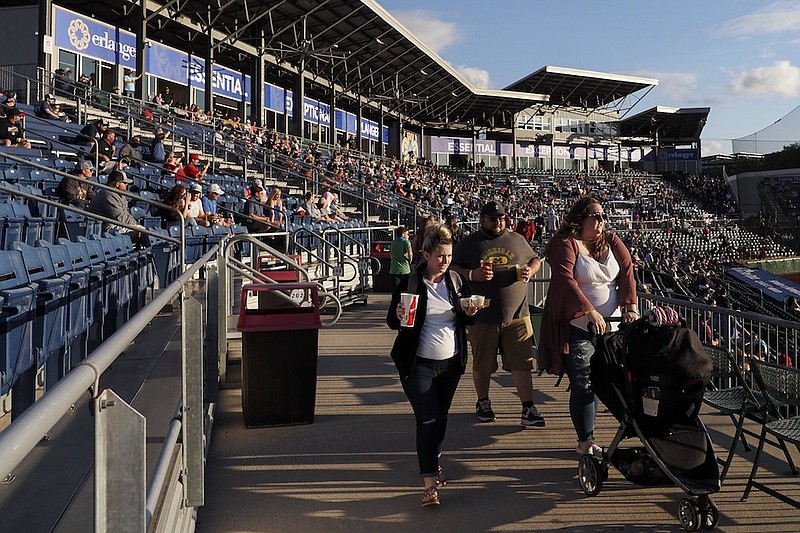What's more American than baseball?
Or as the 1970s commercial jingle put it: "Baseball, hot dogs, apple pie and Chevrolet. They go together in the good ol' USA - baseball, hot dogs, apple pie and Chevrolet."
In 2020, with a global pandemic raging, you could still get hot dogs, apple pie and a Chevrolet. But you could only watch baseball on television, and you couldn't see minor league baseball at all.
That hit a lot of teams, such as Chattanooga's Lookouts, right in the wallet.
As team president Rich Mozingo told this newspaper's David Paschall, the only revenue the team had coming in was from gift shop sales, a couple of high school baseball games and two fall concerts. And while the organization received two rounds of assistance from the federal Paycheck Protection Program, Mozingo and his entire staff were furloughed on May 1, 2020.
So when U.S. Sen. Marsha Blackburn, R-Tenn., and a bipartisan group of senators and House members recently introduced the Minor League Baseball Relief Act that would provide minor league teams emergency assistance, it seemed like a godsend.
Better yet is that not one of the Congress members had to explain to the public how the expense would be paid for by soaking the rich or "making people pay their fair share" or by raising corporate taxes. Instead, the legislation would enable minor league baseball to access up to $550 million in emergency grants to be administered by the Small Business Administration and made available through funding authorized under previous COVID-19 relief legislation that would otherwise be returned to the Treasury Department.
Now the bad news.
The funding would only be made available to minor league baseball if it is determined there is no longer a need for its originally intended purposes and it would otherwise go unused.
Sad to say, but rare is the public office that says it's got all the money it needs, thanks. Here, put the rest back in the federal reserve.
We remember vividly, in just one example from President Barack Obama's American Recovery and Reinvestment Act of 2009, how programs at the University of Tennessee at Chattanooga were told they needed to order new furniture - not because what they had was in bad shape but because if they didn't they would lose the funding.
Now the other bad news.
There are other hands out seeking the unused relief money.
A bipartisan group of 10 senators already has suggested that unspent COVID-19 relief money, plus new fees on electric vehicles, be among the ways the government pays for the proposed $1.2 trillion infrastructure plan.
A deputy White House press secretary recently told reporters that all but about 5% of the relief funds approved before this year's American Rescue Plan have been spent, and that of the remaining amount the largest "unobligated balances" are in funding for rural hospitals and health care providers as well as disaster loans for small businesses.
Whether those disaster loans for small businesses may account for some of the money Blackburn and her colleagues have in mind, or whether it all would come from the excessive plan passed earlier this year is not clear.
But it is clear some states will fight before they give up a single penny.
In California, for instance, which as of last week had not spent any of the $27 billion it received in the American Rescue Plan and has a $75 million budget surplus because of the previous relief funds it received, state treasurer Fiona Ma wrote to Congress saying repurposing any funds "would result in a massive loss of revenue for large and small communities alike."
Similarly, mayors and local lawmakers are pleading for the funds not to be used for infrastructure. A joint letter from the U.S. Conference of Mayors, the National League of Cities and the National Association of Counties maintains the funds are "to address the ongoing impacts of the coronavirus pandemic (actually about 9% of the funds, according to various fact-checkers) and are essential to providing emergency assistance to households and small businesses, maintaining critical government services, driving economic recovery and addressing the ongoing public health crisis."
We don't envy the situation the Lookouts and other minor league franchises, who employ about 3,300 full-time and 32,000 part-time workers, find themselves in. Many a teenager - we can say with some authority - have found their first jobs at such places. Of course, restaurants and various tourist attractions also find themselves in the same boat.
We don't know what the prospects of passing the Minor League Baseball Relief Act are. We hope for the teams' sakes they are good. But we also know about the reluctance of public and private entities of giving back money once awarded.
While such legislation is debated over the next many months, the one sure-fire way we can do our part is to attend games. Minor league baseball is a relative bargain, and it's hard to beat a night at the ol' ballpark, especially when it helps the team.
